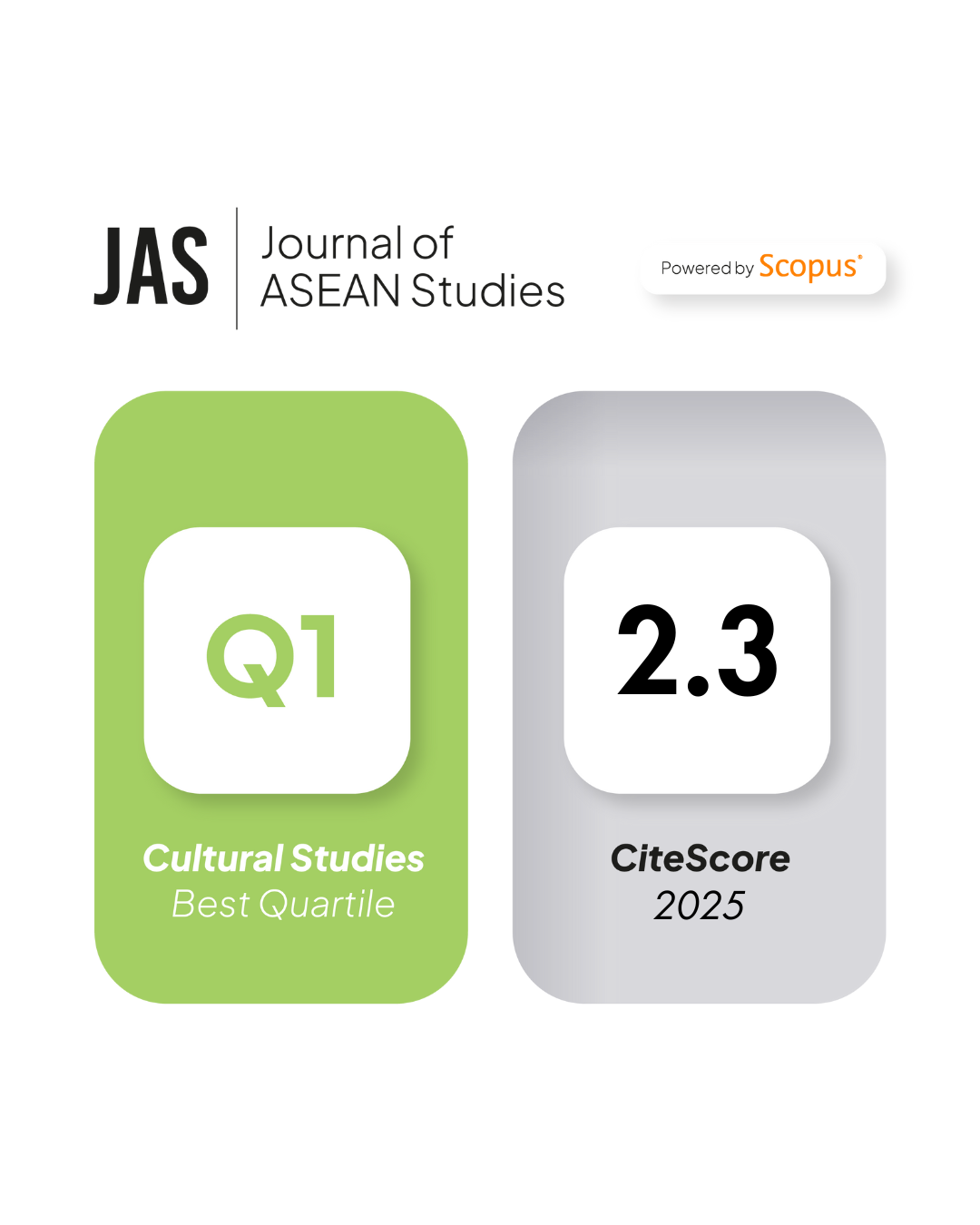Academic Capitalism in Southeast Asia: Lessons from Islamic Universities in Indonesia
DOI:
https://doi.org/10.21512/jas.v12i2.11501Keywords:
Academic capitalism, Islamic University, IndonesiaAbstract
Indonesia’s demographic potential has fueled increasing demand for higher education, creating opportunities for private universities to address gaps left by public institutions. Many private universities in Indonesia, particularly Islamic institutions, integrate religious values as a core identity while navigating the pressures of academic capitalism. This research investigated how academic capitalism reshapes Islamic universities, compelling them to balance their religious values with global market demands and aspirations for world-class status. This research explored the strategies Islamic universities adopt to navigate these challenges by employing qualitative methods. The findings identify two dominant responses: a pragmatic model, which prioritizes global rankings and revenue generation as indicators of institutional success, and an idealistic model, which integrates rankings cautiously while emphasizing the preservation of Islamic values. These models reflect the diverse ways institutions reconcile external pressures with their missions. Despite challenges, Islamic universities demonstrate resilience, crafting strategies to balance their educational mission with the demands of globalization. The research emphasizes the need for context-sensitive approaches that align global frameworks with local religious and cultural values, offering insights into the evolving landscape of higher education in Southeast Asia. This balance underscores the critical role of identity and values in shaping the future of Islamic higher education.
References
Annur, C. (2022, March 3). Provinsi Dengan Perguruan Tinggi Terbanyak, Jawa Barat Teratas!. Katadata Media Network. https://databoks.katadata.co.id/datapublish/2022/03/11/provinsi-dengan-perguruan-tinggi-terbanyak-jawa-barat-teratas
Appadurai, A. (2020). Globalization and the Rush to History. Global Perspectives 1(1). https://doi.org/10.1525/001c.11656.
Badan Akreditasi Nasional Perguruan Tinggi. (n.d.). Distribusi Peringkat. Badan Akreditasi Nasional Perguruan Tinggi. https://www.banpt.or.id/?page_id=1903
Badan Akreditasi Nasional Perguruan Tinggi. (2022). Prodi Baru. https://www.banpt.or.id/direktori/prodi/prodi_baru.php
Badan Pusat Statistik. (n.d.). Retrieved September 24, 2022, from https://www.bps.go.id/indikator/indikator/view_data_pub/0000/api_pub/cmdTdG5vU0IwKzBFR20rQnpuZEYzdz09/da_04/1
Balatsky, E., & Ekimova, N. (2012). The Global University Rankings: The Problem of Manipulation. Journal of the New Economic Association, 13(1), 126–46.
Darlington, Y., & Scott, D. (2002). Qualitative Research in Practice: Stories from the Field (1st edn.). Routledge.
Dearden, J. A., Grewal, R., & Lilien. G. L. (2019). Strategic Manipulation of University Rankings, the Prestige Effect, and Student University Choice. Journal of Marketing Research, 56(4), 691–707.
Dedy. (2017, February 17). STMIK Amikom Jadi Universitas. Media Indonesia. https://mediaindonesia.com/humaniora/92579/stmik-amikom-jadi-universitas
Fathana, H., & Rachman, A. A. (2022, March 26). Pemeringkatan Kampus: Praktik Imperialisme Budaya Yang Menjebak Perguruan Tinggi Dalam Perlombaan Kosong. The Conversation. https://theconversation.com/pemeringkatan-kampus-praktik-imperialisme-budaya-yang-menjebak-perguruan-tinggi-dalam-perlombaan-kosong-178536
Goglio, V. (2016). One size fits all? A different perspective on university rankings. Journal of Higher Education Policy and Management, 38(2), 212–226. https://doi.org/10.1080/1360080X.2016.1150553
Indonesian Ministry of Religious Affairs. (2023). Statistik pendidikan tinggi Islam. Ministry of Religious Affairs. https://www.kemenag.go.id
Indonesian Ministry of Research, Technology, and Higher Education. (2023). Data akreditasi dan peringkat universitas. https://www.ristekbrin.go.id
Jarvis, D.S.L., & Mok, K.H. (2019). The Political Economy of Higher Education Governance in Asia: Challenges, Trends and Trajectories. In D. S. L., & K. H. Mok (Eds.), Transformations in Higher Education Governance in Asia (pp. 1-46). Springer. https://doi.org/10.1007/978-981-13-9294-8_1
Jessop, B. (2018). On academic capitalism. Critical Policy Studies, 12(1), 104-109. https://doi.org/10.1080/19460171.2017.1403342
Lau, J. (2021, June 24). Is South-East Asia higher education’s next global hotspot?. Times Higher Education (THE). https://www.timeshighereducation.com/features/south-east-asia-higher-educations-next-global-hotspot
Marginson, S. (2016). The dream is over: The crisis of Clark Kerr’s California idea of higher education. University of California Press.
Menegaskan Peran Perguruan Tinggi Islam Swasta. (2023, November 20). Universitas Islam Indonesia (UII). from https://www.uii.ac.id/menegaskan-peran-perguruan-tinggi-islam-swasta/
Mittelman, J. H. (2016). Globalization and its critics: Perspectives from political economy. Cambridge University Press.
Nemec, J., Wahid, F., Fathana, H., & Raharjo, W. (2020). Assessing the impact and the quality of research: Manual and slected practice. Printinghouse GUPRESS.
Paravee, M., & Woraphon, Y. (2021). The Impact of Higher Education on Economic Growth in ASEAN-5 Countries. Sustainability, 13(2), 520. https://doi.org/10.3390/su13020520.
Ramadhani, Y. (2023, January 19). 58 PTN perguruan tinggi Islam negeri: UIN, STAIN, hingga IAIN. Tirto. https://tirto.id/58-ptn-perguruan-tinggi-islam-negeri-uin-stain-hingga-iain-gBjc
Rhoades, G., & Slaughter, S. (1997). Academic Capitalism, Managed Professionals, and Supply-Side Higher Education. Social Text, 51, 9-38.
Salahuddin, M. (2017). Model Pengembangan Pendidikan Tinggi Islam di Indonesia. Ulumuna, 18(1), 121–138. https://doi.org/10.20414/ujis.v18i1.155
Sam, C., & van der Sijde, P. (2014). Understanding the concept of the entrepreneurial university from the perspective of higher education models. Higher Education, 68, 891-908. https://doi.org/10.1007/s10734-014-9750-0
Sari, R. M., & Suyanto, B. (2021). Higher education accreditation in Indonesia: An analysis of the impact of university rankings. Jurnal Pendidikan dan Kebudayaan, 26(1), 47–55. https://doi.org/10.24832/jpnk.v26i1.12345
Sari, R. M. (2016). Perguruan tinggi Islam dan transformasi lembaga: Studi terhadap proses perubahan fungsi dan peran Iain Syarif Hidayatullah Jakarta menjadi universitas Islam. El -Hekam, 1(1), 1–18.
Singgih, D. S., Suyanto B., & Ariadi, S. (2022). Higher Education Capitalism in Indonesia as a Social Problem: A Case Study in the Digital Age. Jurnal Sosiologi Dialektika, 17(1), 13–24. https://doi.org/10.20473/jsd.v17i1.2022.13-24
Slaughter, S., & Leslie, L. L. (2001). Expanding and elaborating the concept of academic capitalism. Organization, 8(2), 154–161. https://doi.org/10.1177/1350508401082003
Slaughter, S., & Leslie, L. L. (1997). Academic capitalism: Politics, policies, and the entrepreneurial university. Johns Hopkins University Press.
Slaughter, S., & Rhoades, G. (2004). Academic capitalism and the new economy: Markets, state, and higher education. Johns Hopkins University Press.
Stack, M. (2021). Global university rankings and the politics of knowledge. University of Toronto Press.
Statista Research Department. (2024, September 18). Population share of the ASEAN countries in 2022, by age. Statista. https://www.statista.com/statistics/1026696/asean-population-by-age/
Steiner, L., Sundström, A.C. & Sammalisto, K. (2013). An analytical model for university identity and reputation strategy work. Higher Education, 65, 401–415. https://doi.org/10.1007/s10734-012-9552-1
Stensaker, B. (2015). Organizational identity as a Concept for Understanding University Dynamics. Higher Education, 69(1), 103–115.
UNESCO Institute of Statistics. (2021). Higher education figures at a glance. https://uis.unesco.org/sites/default/files/documents/f_unesco1015_brochure_web_en.pdf
Welch, A. (2019). Higher education in Southeast Asia: Blurring borders, changing balance. Routledge.
Yolandha, F. (2022, August 5). BPS: Ekonomi Indonesia Masih Terkonsentrasi di Pulau Jawa. Republika Online. https://republika.co.id/share/rg4xav370
Downloads
Published
How to Cite
Issue
Section
License
Copyright (c) 2024 Hangga Fathana, Enggar Furi Herdianto, Karina Utami Dewi

This work is licensed under a Creative Commons Attribution-NonCommercial 4.0 International License.


























